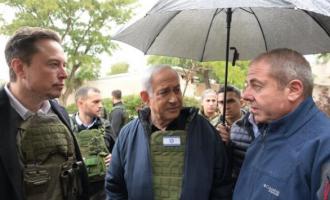At the recent G-20 meeting, the US-EU-India supported the creation of an alternative maritime trade route project to the "Chinese Silk Road", which would start in India and via Oman-Saudi Arabia-Jordan-Israel-E-Mediterranean via Oman-Saudi Arabia-Jordan to Greece and from there to the heart of the EU.
This new sea route, it should be noted, leaves out Turkey, a fact that provoked a strong reaction from Erdogan, who then "sailed" Greece in order to improve relations with us on issues of common interest and low politics, with the ultimate aim of then proceeding to the delimitation of the continental shelf - EEZ in the Aegean and the SE Mediterranean, indirectly claiming a role in the above project.
At the same time, Iran, which is hostile to the West, combined with its six-winged Houthis in Yemen, threaten the safety of navigation in the Straits of Hormuz and Bab el-Mandeb, with the result that the Arab countries of the Gulf are looking for shorter and safer land routes to bring their oil and gas to the EU.
For their part, Israel and the USA seem to be promoting, as a partial solution to the above, the construction of the Ben Gurion Canal, which would connect the Gulf of Aqaba, Israel's Eilat port, with the Israeli port of Ashkelon in the Mediterranean Sea, via a sea canal to be built, bypassing the Suez Canal.
Background
According to International Media, in July 1963, the US Department of Energy and the Lawrence Livermore National Laboratory produced a classified document outlining a plan to use 520 underground nuclear explosions to assist in the process of excavating the hills in the Negev Desert. The document was declassified in 1993.
The project would connect the Gulf of Aqaba to the Mediterranean Sea. David Ben Gurian, after whom it would be named, is considered the founder of Israel and was Israel's first prime minister.
The canal would rival the Suez Canal that runs through Egypt, which has had many upheavals in its history, including the closure of the Suez Canal (1956-1957 and from 1967-1975) and a blockage due to the capsizing of a large ship in 2021.
It would be almost a third longer than the Suez Canal (194 km) which is almost 300 km. The cost of creating the Israeli canal is estimated to be in excess of $16 billion.
The capsizing of the cargo ship in the Suez Canal for more than six days and the failure to float the ship was not the news or the reasons behind the accident. But the real news behind it was the need to revive the Ben-Gurion Canal project.
The proposed canal starts at the southern end in the Gulf of Aqaba, from the port of the Israeli city of Eilat on the Israeli-Jordanian border and ends at the Israeli port of Ashkelon in the Mediterranean Sea, north of the Gaza Strip.
Dominance in Maritime Trade
The Israeli Ben Gurion Canal would represent more than an artificial miracle , signalling a major change in the dynamics of global maritime trade.
Significantly wider than the Suez Canal, it would accommodate an increased number of ships because it would be built on harder ground than the sand at Suez, the canal would allow two-way traffic , allowing vessels to transit in both directions simultaneously.
This project is not just a logistical improvement, as it is to be a profound affirmation of Israel's intention to become the epicentre of global maritime trade.
The new Israeli canal would offer unparalleled military advantages by strengthening Israel's defenses and providing a barrier against potential threats from the south. Such a strategic advantage in a volatile region could reshape the balance of power.
Challenges for the construction of the Israeli canal
The following seem to be the challenges for its construction:
1.Opposition from Arab nations led by Egypt as its revenues from the Suez Canal are estimated at $8 billion. Once Ben-Gurion is activated it will drop to $4 billion.
2. The construction of the Ben-Gurion Canal may take several years with the participation of some 300,000 engineers and technicians recruited from all over the world.
3.The projected canal will cross a variety of land configuration such as desert, mountainous terrain and the Dead Sea Basin which is below sea level.
4.Underground nuclear explosions are likely to receive reactions.
5.Egypt may decide to widen the Suez Canal at a third of the cost proposed by Israel.
The Port of Haifa
Traditionally, trade between India and Europe has relied heavily on the Suez Canal.
Following the acquisition of the Port of Haifa, Israel's second largest port, by a consortium led by the Indian conglomerate Adani, it is being transformed into a world-class facility that can provide an alternative route, in addition to challenging China's growing footprint in the region.
Ron Malkha, former Israeli envoy to India, the executive chairman of the Haifa Ports Company says the aim is to develop the Haifa Port as a true gateway linking the East to the West.
Ben Gurion Canal will bring big changes at the global level
In conclusion, we would say that one of the main military benefits for Israel is that the Ben Gurion Canal will completely remove the importance of Suez for the US military, should it need to rush to Israel's aid.
Israel will push Egypt into the corner ,eliminating Suez from a global trade and energy corridor and becoming a global trade and energy supply chain center itself.
Experts believe that this situation will shake the strategic-energy balance of China's Belt and Road project, while the Ben Gurion Canal would have the firm support of the West.




